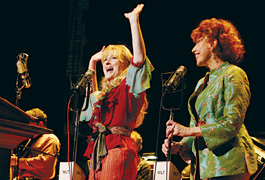home | metro silicon valley index | movies | current reviews | film review

Photograph by Melinda Sue Gordon
Sisters: Meryl Streep (left) and Lily Tomlin duet in 'A Prairie Home Companion.'
Keillor Hauled
Robert Altman and Garrison Keillor treat film version of 'A Prairie Home Companion' like an obituary of old-time musicals
By Richard von Busack
EVERY BROADCAST of NPR's A Prairie Home Companion is like a nondenominational sermon delivered to some 3.9 million people. I am certain that many people listen because it seems mildly good for the soul—that it's a radio church so loose it makes the Unitarians seem like hard-shell Baptists, and that they emerge from Garrison Keillor's murmuring session with a determination to be less selfish and cruel in the coming week.
Some have accused host Keillor of whitewashing the real-life Lake Wobegon. Keillor doesn't overlook the backwardness, anti-intellectualism and intolerance that can be endemic in small towns. Keillor has said that when he dreams of Lake Wobegon, he gets the feeling that he wouldn't quite be welcome there. If such a hamlet exists, it exists only within the city limits of A Prairie Home Companion's radio village. When visions of small, honest towns flourish, it is not that the small towns are so attractive, it is just that the cities have grown so relentlessly tough.
Keillor himself must have second thoughts and mixed feelings about the stories that he has told for years, since his script for the film A Prairie Home Companion trashes this gentle fantasy of a modest, earnest America in favor of a gloomy and maudlin backstage drama. In the lead, Keillor plays himself as remote—remote, hell, a real Asperger's syndrome case. (If you had only encountered Keillor as an avuncular voice on the radio, A Prairie Home Companion could be a nasty surprise.)
He putters around, getting the show ready for one final run, but it seems as if he has already tuned out. Hired as temporary security detective, Guy Noir (Kevin Kline, stagy and unfunny) prowls through the dressing rooms. The theater itself is to be torn down the next day by a brutal Texas millionaire known as the Axeman (Tommy Lee Jones). In the meantime, an angel in a belted trench coat (Virginia Madsen) alights to watch the broadcast.
Guests on the final show are an old-time sister act, Yolanda and Rhonda Johnson (Meryl Streep and Lily Tomlin); hanging around and entertaining herself by scribbling on her Levis with a Bic pen is Rhonda's daughter, Lola (Lindsay Lohan). Lola has stage fright, compounded by an allergy to cornball music. For a time, Streep and Tomlin are as charming as they were on the Oscars, playing these bubbling chanteuses who have performed together for so long that they talk over the top of each other. Director Robert Altman's time-honed gift for glancing over conversations and leaving them dangling is at its best when these ladies are primping for their set.
Altman contrasts their act with the raunch of singing cowboys Dusty and Lefty (Woody Harrelson and John C. Reilly). They do a number called "Bad Jokes" that has a profane streak—is this supposed to be the 10pm adult show of A Prairie Home Companion? In the context of a family broadcast, it's creepy.
The film doesn't go near Lake Wobegon; instead, it's a 1930s-style stage-door musical, tilted by Altman and Keillor into wintry emotions. The cold producer (Keillor instead of Adolph Menjou) doesn't show a warm heart at the last moment, the ingénue doesn't become a star overnight and the mortgage isn't lifted by the last-minute hit.
The reason for a backstage musical is to showcase the tunes, and this is where A Prairie Home Companion is a huge disappointment. Show regulars Robin and Linda Williams are shot from a middle distance, and Altman doesn't pick up on the kinetic excitement of the trad bluegrass they play. Streep isn't at all a bad singer—for example, her saloon-shouter rendition of "He's Me Pal" was a highlight of Ironweed. But Streep and Tomlin's duet "Softly and Tenderly (Jesus Is Calling)" plays to Streep's deservedly mocked taste for the downbeat. And couldn't Lohan have found a tune less chestnutty than "Frankie and Johnny"?
Even the theater is miscast; the Fitzgerald Theater in St. Paul is a newly renovated venue of shining brass and blond wood. Who would take the wrecking ball to a place like that? This kind of story really needed a grand, decaying flea pit.
"The film is about death," Altman said during shooting. The film mixes his own feelings of mortality with Keillor's Scandinavian isolation. It is a bad mix—a dying art combined with a lack of human connection. A coda takes place at a cafe, in an attempt at a happy ending, but it seems as forced as the heavy symbolism of a pregnant lady brushing elbows with an angel of death.
Why this premature obituary for the kind of broadcast A Prairie Home Companion represents? Does even Keillor believe that old-timey, folk and blues music is on its way out? That's strange, because Americana music seems more vigorous than ever. The Internet allows non-Top-40 musicians a better chance than ever at making a living, and roots performers and audiences alike are energized with populist fury. Have you heard what Bruce Springsteen just did with "Oh, Mary, Don't You Weep"? Does that sound like a tradition that's dead on its feet?
![]() A Prairie Home Companion (PG-13; 105 min.), directed by Robert Altman, written by Garrison Keillor and Ken LaZebnik. photographed by Edward Lachman and starring Woody Harrelson, Keillor, Meryl Streep and Lily Tomlin, opens June 9.
A Prairie Home Companion (PG-13; 105 min.), directed by Robert Altman, written by Garrison Keillor and Ken LaZebnik. photographed by Edward Lachman and starring Woody Harrelson, Keillor, Meryl Streep and Lily Tomlin, opens June 9.
Send a letter to the editor about this story.
|
|
|
|
|
|